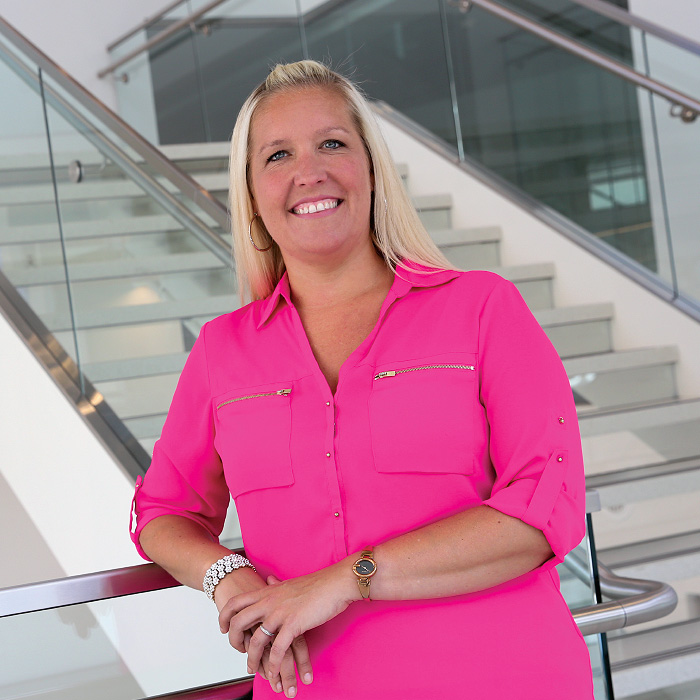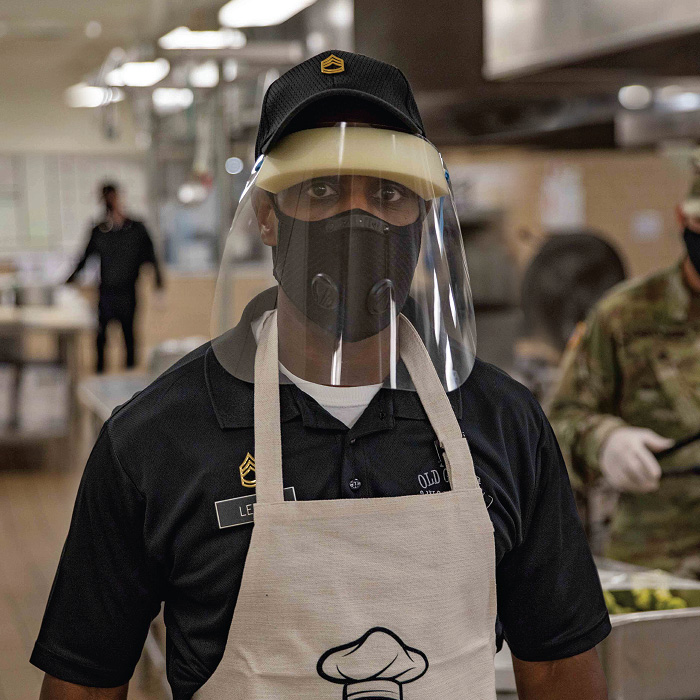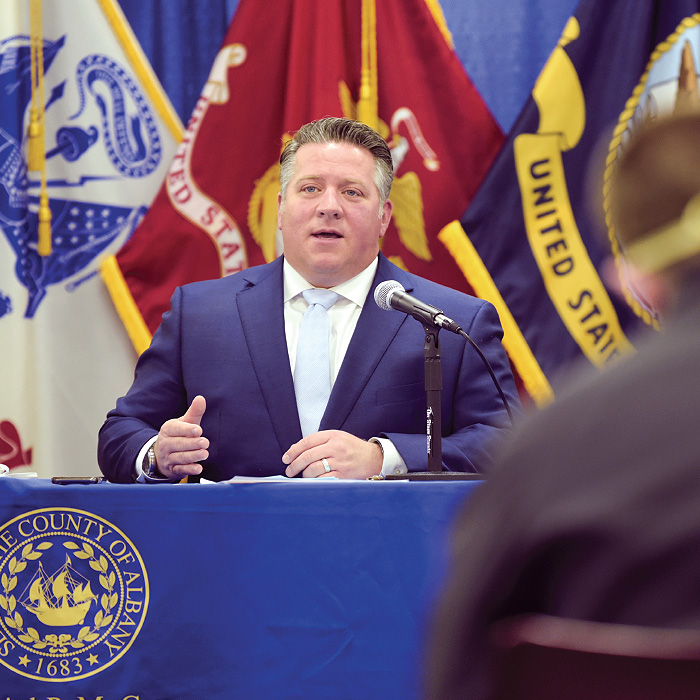COVID Coping

For more than half a year, the coronavirus (COVID-19) pandemic has changed how we live and how we work. Alumni Jonathan Green, Alison Noone, Timothy Leaks, Lakeya Collins, and Daniel McCoy adapted quickly to address unprecedented challenges and meet the needs of those they serve.
Jonathan Green’s leadership helps hospital staff care for patients during the pandemic
University Hospital in Newark, New Jersey, was one of the hospitals hardest hit by patients with COVID-19 at the height of the pandemic in spring 2020. Three-time Excelsior College graduate Jonathan Green is the executive director of University Hospital’s emergency department, and since March, his job has been to make sure his staff have everything they need so they can take care of patients.
In early 2020, the hospital developed organizational protocols to receive patients and do travel screening for the virus, which at that time, had not yet arrived in the United States. By March, they had erected tents outside the emergency department to triage patients and identify those with symptoms. Hospitals in New York City, located eight miles east of Newark, were dealing with the pandemic a week or two ahead, so Green and his staff were able to prepare. “Patients who had respiratory symptoms were quickly evaluated by the triage nurse. Those with stable vital signs were seen by a physician or nurse practitioner in a large tent outside the emergency department to assess how they were doing,” says Green, adding that if the patient was stable, they could be discharged without ever coming into the hospital. But as the virus spread quickly, staff could not stop the influx of patients and people had to be admitted to the intensive care unit.
One of the many difficulties Green and his staff faced during the height of the pandemic, in the spring, was reassuring people with no symptoms to still seek medical attention for what was ailing them.
At the peak of the pandemic, Green says the emergency department saw 140 to 150 people with symptoms per day and 75 percent of them tested positive for the virus. The hospital received assistance from the U.S. Department of Defense, and a U.S. Army Reserve task force helped to augment the medical staff.
Hospitals in northern New Jersey openly communicated with each other, sharing best practices, helping each other coordinate moving patients to field hospitals, and lending needed equipment. For example, physician teams from University Hospital worked with infectious disease experts at Rutgers University and across the country to learn as much about COVID-19 as possible. With the aid of other hospitals and local and state government, University Hospital was able to supply staff with respirators, gowns, masks, hospital beds, plexiglass, plastic bed sheets, and everything else needed to care for patients. With these supplies, Green was able to make sure his staff had the materials they needed to stay safe and encouraged them to follow safety protocols, such as maintaining social distancing and washing their hands.
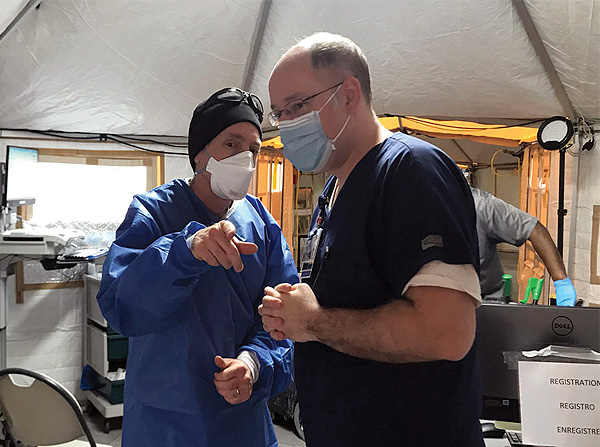
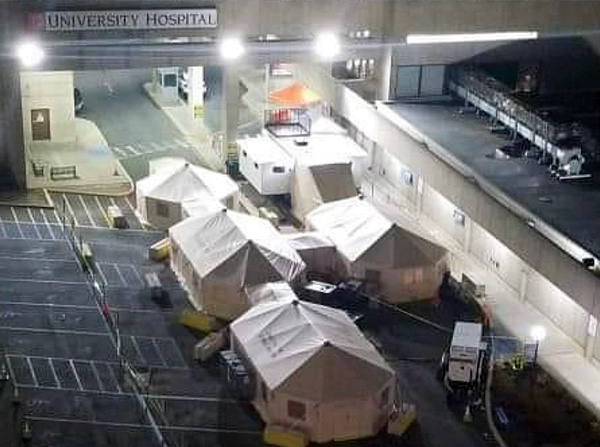
One of the many difficulties Green and his staff faced during the height of the pandemic, in the spring, was reassuring people with no symptoms to still seek medical attention for what was ailing them. “People with heart attacks or strokes or other really serious medical issues were so scared to come here,” he says. Ultimately, the hospital discovered a way to help Green combat this problem. The hospital hosted community outreach events and used social media to encourage people to seek help. The news media also helped with reminding people about the importance of seeing a doctor. University Hospital implemented virus testing and designated units in the hospital where Green and his staff would care strictly for patients with COVID-19 to keep them separate from patients who did not have COVID-19.
Despite precautions, Green and several of his colleagues ended up contracting the virus. This was a difficult time for Green, who wanted to be there for his staff during this time when the ER was seeing many patients. Green was fortunate to have only mild symptoms, though, and was able to return to work relatively quickly. One of the reasons he wanted to return to work as soon as possible was because it was hard to see many of his staff having a difficult time interacting with patients who were so sick with COVID-19. “That was a source of stress, and some of them were really distraught over it,” says Green. University Hospital sought the help of two mental health experts from the U.S. Army Reserve to support medical staff during this challenging time.
In September, the number of patients the University Hospital emergency department staff saw with the virus varied each day. Under Green’s direction, staff are still following safety protocols and have adapted to the new normal. They adhere to the masking policy, have adjusted how food is delivered, and have decided to conduct a combination of virtual and in-person meetings for administrative work. Green’s main goal remains to support his staff — the frontline workers caring for the patients. “I take care of the people who take care of the patients,” he says.
Alison Noone uses technology to keep students engaged from a distance
Two-time Excelsior graduate Alison Noone is the assistant director of student life at Ocean County Community College on the Jersey Shore. She has experienced firsthand the toll the COVID-19 pandemic has had on institutions of higher learning. Still, she and her staff have taken successful steps to adjust to the new norm, including developing a mobile device app that helps students keep in contact with each other and the community college.
Noone has been with Ocean County Community College for almost two decades, starting as a student worker in the Student Life Office and then taking on positions of increasing responsibility. She is currently in charge of keeping students engaged and encouraging them to progress forward with their studies.
Since the COVID-19 outbreak, Ocean County Community College has gone 100 percent remote. Noone can appreciate that it might be difficult for many students to transition to online-only learning. “I feel for the students who didn’t want to take classes online. I’ve taken classes online and I’ve taken classes as a student traditionally, face to face, and it is a transition. If you’re forced into it, I understand that it’s hard to accept and it’s a hard concept,” she says.
The plans for offering all classes, except for certain biology labs, remotely will continue at least through the spring 2021 semester. So, student engagement will also take place online. Students engage with the college virtually, via Canvas for courses, and through an app that the Student Life Office developed in conjunction with the communications company Ready Education.
Since the COVID-19 outbreak, Ocean County Community College has gone 100 percent remote. Noone can appreciate that it might be difficult for many students to transition to online-only learning.
Normally the app is just a supportive tool, but now that everything is virtual, it has become like a lifeline for students. “Whenever something big [happens] or big announcement will come out, we will have a spike of 1,000 sign-ups onto the app a day — we’ve had a flurry of posts and questions,” Noone says. Students have come to embrace the app’s functionality that allows them to communicate with each other and the college.
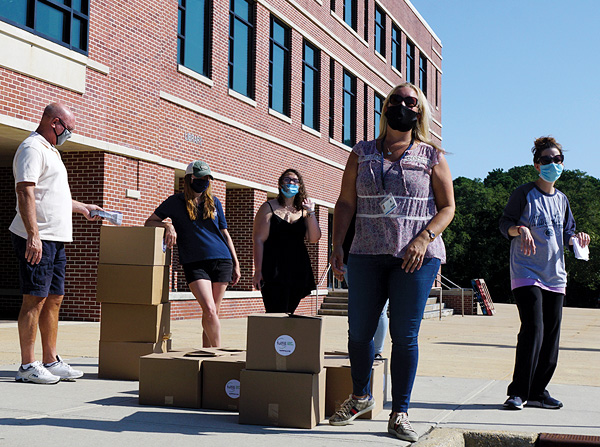
Noone says they have been able to use the app to follow when and how many students check into the app throughout the day. With information like this, they have conducted trivia contests, set up virtual clubs, and even held movie nights where students could watch a movie on their computers or smart devices and participate in a corresponding chat with others on the side of the screen. With all the creative ways Noone’s department has used the app, Ready Education recognized them for their best practices.
The extracurricular leadership program that Noone runs for students has also changed to a more virtual experience. Normally a three-part series with public speakers, Noone has worked to provide the program’s courses online with recorded presentations and links to videos from her Student Life colleagues. The program does not count toward college credit, but it is a great resume booster, says Noone.
The Student Life Office works entirely remote, but Noone visits the campus regularly to run the college’s food pantry. The pantry technically isn’t open during this time to collect donations, so Noone has been partnering with a local food bank to provide prepared food boxes to students in need. Students sign up in advance to reserve a food box and then come to the campus to pick it up. The food boxes are placed directly in the students’ car trunks to minimize social contact. For students who are not able to travel to the campus, Noone personally mails them gift cards the college has purchased from a local grocery store so they can get the supplies they need.
Remaining virtual appears to be the norm for the remainder of 2020 and Noone is committed to ensuring students have the tools and methods they need to meet their educational needs. “I want students at Ocean [County Community College] to succeed and believe they can, despite all the challenges they must overcome,” she says.
Timothy Leaks maintains a tight ship to keep servicemembers safe and fed
Feeding 300 servicemembers per meal during a pandemic might seem like a straightforward task, but it is not as easy as it sounds.
Timothy Leaks, the dining facility manager for the 3d U.S. Infantry Regiment’s (The Old Guard) facility in Arlington, Virginia, is charged with this task every day. However, thanks to guidance from the Centers for Disease Control and Prevention (CDC) and the state, he makes sure his staff continue feeding customers while staying safe.
“Since COVID-19 happened, we had to basically modify and kind of restructure the way we do business here,” says Leaks. Prior to the pandemic, servicemembers were permitted to eat in the cafeteria, but now the place runs like many other restaurants around the United States by offering only carry-out and pre-packaged meals. The changes are necessary for the cafeteria to remain functional. Leaks says closing the cafeteria is not an option; it is the only facility in the area that can feed the servicemembers. So, Leaks and his staff must make sure their facility is completely clean or it is not allowed to open for service.
Leaks, a 2019 graduate with a Bachelor of Science in Liberal Arts, is enrolled in Excelsior College’s Master of Science in Criminal Justice program. He and his staff have been following CDC protocols, maintaining social distancing, wearing masks and shields, and wearing gloves at all times. It’s up to Leaks to monitor his staff and ensure they are staying safe. “I make sure we keep our distance, make sure we wash our hands like we’re supposed to … I walk around and make sure everybody’s doing what they’re supposed to,” says Leaks. Sometimes maintaining social distancing when preparing food close together is hard. For example, it is typically uncomfortable for staff when the temperature in the kitchen can reach upward to 120 degrees Fahrenheit. Now, with adding the necessary safety measures due to the pandemic, moving around the hot kitchen has become even less pleasant.
He and his staff have been following CDC protocols, maintaining social distancing, wearing masks and shields, and wearing gloves at all times. It’s up to Leaks to monitor his staff and ensure they are staying safe.
To help ease pressure on the kitchen staff and to further prevent contamination, Leaks organized staff into a morning shift and an afternoon shift so they could come into work and leave without interacting with each other. Setting up shifts this way has helped minimize the risk of spreading the COVID-19 virus. Unfortunately, when staff have gotten sick, work has become difficult because there are usually only 13 people assigned per shift. So, when a few people have gotten sick and needed to quarantine, their absence made working more stressful for the staff.
Still, Leaks and his team have pushed through and have managed to keep feeding the hungry servicemembers who come through the cafeteria doors. Anyone who comes into the cafeteria has their temperature checked and must wear a mask at all times. Adhering to these guidelines is critical so that Leaks can properly manage the operation. Leaks and his staff not only follow safety guidelines, but also receive updates on the virus from medical staff and briefings on sanitation procedures.
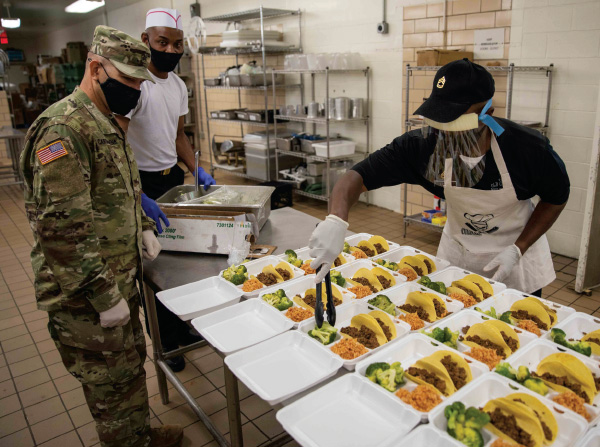
Leaks believes the new safety procedures will be in place well beyond the next few months. “Even when COVID-19 goes away, these are things I could see happening for the perceived future,” he says. That’s okay with him because he thinks people in addition to his staff should have been taking simple safety precautions, like washing their hands correctly, all along. The contagion factor of the virus is something personal to Leaks; he has a high-risk spouse and a young child at home so he knows how important it is to keep safety protocols in place. In fact, as soon as Leaks returns home from work, he goes right to the garage to change his clothes, wash up, and wipe down his car. When his family is involved, he doesn’t want to take any chances.
And, Leaks is thankful for his supportive family and also a behavioral therapist with whom he can talk when things get too stressful. He often worries about customers being exposed to COVID-19 and is concerned about the lack of knowledge surrounding the virus. Despite these concerns, Leaks maintains order for his staff and provides them with the information and supplies they need to do their job well. And if his staff are also stressed and worried, they have opportunities to contact professional services that the facility has supplied. As a 20-year veteran, Leaks is used to talking with someone and is glad there are providers available, offering support to frontline workers like him.
With Leaks’s oversight of the dining facility, servicemembers in the Arlington area are guaranteed a meal — or three — each day. By adhering to the rules, Leaks keeps his staff and customers safe. As a result, by also following his personal protocols and maintaining a sound mind, he is better prepared to lead his team so that they can provide food and a sense of normalcy during such a critical time.
Lakeya Collins takes extra measures to care for nursing home residents
According to a study published in USA Today, residents of nursing homes account for nearly 40 percent of the nation’s COVID-19 death toll. Amazingly, the nursing home where Lakeya Collins works saw zero cases of the virus until September 2020, in part because of the dedication Collins had to maintaining the residents’ safety.
Collins, a 2018 graduate who earned an associate degree in nursing, has been working to help maintain the low virus infection rate at The Place at Dean’s Bridge, a skilled nursing facility in Augusta, Georgia. As of mid-September, the nursing home had 16 confirmed cases, but for over six months before that, the nursing home had zero cases. This is a remarkable feat since in Richmond County, where Augusta is located, there were approximately 785 cases of COVID-19 by late June and the number of people diagnosed with COVID had increased by 8.4 percent since then. On September 5, there were 280,000 cases in Georgia; 6,634 of those were in Richmond County.
The Place at Dean’s Bridge initially managed to keep infection rates at zero through the dedicated work of employees. At the onset of the virus’s spread, Collins joined a special COVID-19 taskforce to help implement and maintain safety procedures so that residents at the facility remained safe from infection. The facility has continued to follow the Centers for Disease Control and Prevention (CDC) guidelines and has maintained strict social distancing rules to avoid contamination between staff. Residents are tested twice a week for the virus to keep tabs on its spread.
Since visitors aren’t allowed, so that the facility can maintain social distancing, Collins has taken it upon herself to make sure her patients have contact with their loved ones.
As a member of the task force, Collins is in charge of ensuring residents’ vital signs are checked but says they can assess only those residents who have had a negative COVID-19 test. She also takes extra steps to look after the patients’ emotional well-being. Since visitors aren’t allowed, so that the facility can maintain social distancing, Collins has taken it upon herself to make sure her patients have contact with their loved ones. By lending them her personal cell phone, they can make FaceTime calls with family members. She also tries to dissuade residents from watching COVID-19–related news because she doesn’t want them to get upset from the negative information. Keeping positive with the residents is difficult, but Collins tries to add some happiness into everyone’s day. “I might go buy them chicken nuggets — just something to keep them going, to put a smile on their faces,” Collins says. She also plays music and reads scripture to many of the residents, which keeps them looking on the bright side.
Admittedly, Collins was nervous and even paranoid in the earlier months of the pandemic, constantly checking her temperature and making sure not to come in contact with others. Seeing people on the local and national news on ventilators and in intensive care units was hard, so it made her work stressful. Over time, she says she has gotten used to it. “It’s like everything else in nursing; you become accustomed to it. You do what you’re supposed to do,” she says. Now that several residents are infected, Collins makes extra sure she maintains proper safety measures, including washing her hands before going home. Although she is taking precautions, she doesn’t want to inadvertently spread the virus to her 10-year-old son. “That’s my biggest fear, but we do our best to make sure going through our daily lives is safe,” she says.
Collins feels she’s done a good job caring for the residents and works hard to follow the CDC and her facility’s guidelines. During this pandemic, she wants people to understand what really goes on in hospitals and facilities such as The Place at Dean’s Bridge to keep people safe, and to pay attention to the virus. She says, “I just want people to take it [COVID-19] more seriously so we can get past this part of the numbers increasing, we can get a vaccine, and people can go on with their lives at a safe space in the midst of it.”
Elected official Daniel McCoy maintains contact with the public to keep people safe
As county executive, 2009 alumnus Daniel McCoy is leading Albany County in northeastern New York state through the COVID-19 pandemic. His job of providing people with the facts and letting them know what resources are available through the Office of the County Executive has proven difficult during this time of social distancing. However, in spite of the challenges, he has been able to keep in touch with the public.
McCoy is no stranger to COVID-19 and knows how it can affect people. He underwent an antibody test in May that revealed he had coronavirus antibodies, meaning he had previously contracted the virus. Doctors estimate McCoy probably had it sometime during winter 2019–2020. In an article for the Times Union [Albany, New York] published on August 3, 2020, he said, “It was scary because I didn’t know what I was dealing with at the time, but I knew I was really sick. It doesn’t mean I can’t get it again. It just means I had it once and got through it. So I am cautious.”
His cautiousness is helping to keep others safe and informed. Since March, McCoy has been holding daily briefings to provide safety information to the public. During these briefings, which are shown on Facebook, posted on the office’s webpage, and covered by local media, McCoy regularly gives updates and conveys information about social distancing, wearing a mask, good hand hygiene, and keeping germs to yourself by coughing into your elbow. “We’re trying to be proactive. I’m not trying to scare anyone. We’re just trying to say, it’s here, it’s been here, [and] we need to stay calm, but you need to be prepared,” McCoy said.
To help with issues related to staying safe, the executive office also began providing videos on arts and crafts projects and other activities to do with children, as well as giving tips on maintaining mental health. McCoy directed the Albany County Department of Mental Health to establish a COVID-19 support line for people in the community who are experiencing stress, anxiety, or depression to call seven days a week.
COVID-19 has brought many trying days, and McCoy says March 28 was a particularly dark day. He had to announce the first death from the virus in Albany County. “For me as county executive, it hits you hard. It’s important to remember that each and every death represents a family or loved ones who just lost someone extremely important to them,” he says. March 28 was also difficult because McCoy and his staff realized that the pandemic was just beginning, and there was a tough road ahead.
That tough road ahead is something that keeps McCoy up at night.
As of September 12, 2020, there have been 2,859 cases and 134 deaths from COVID-19 in Albany County. Although any number is a bad number, Albany County’s infection rate is much lower than other metropolitan areas in the state. For instance, New York City has reported 242,000 cases, Erie County (Buffalo area) has reported 10,444, Monroe County (Rochester area) has reported 5,649, and Onondaga County (Syracuse area) has reported 4,023. Keeping Albany County’s numbers comparatively low has been at the forefront of McCoy’s mission.
“My job as a leader has been to provide that leadership the community needs, inform members of what is happening, and give them the assistance they require.” – Daniel McCoy
“My job as a leader has been to provide that leadership the community needs, inform members of what is happening, and give them the assistance they require,” says McCoy. In February, he worked closely with the National Guard to help deliver boxes of food to people in quarantine. Being a National Guard member himself, McCoy has used his past military experiences to inform his approach to leadership during this pandemic. He says you need to act quickly in times of crisis, something he learned while enlisted.
With McCoy’s leadership, Albany County took steps to ensure health equity. Albany County became the first county in New York to establish mobile testing sites for people who were unable to travel to get tested for the virus (and the initiative expanded to neighboring counties). He also partnered with the Albany Police Athletic League, which builds partnerships among youth, police, and the community through collaborative programs, and AT&T to launch an Instagram challenge that encouraged teens to post videos and photos that showed how they were staying safe.
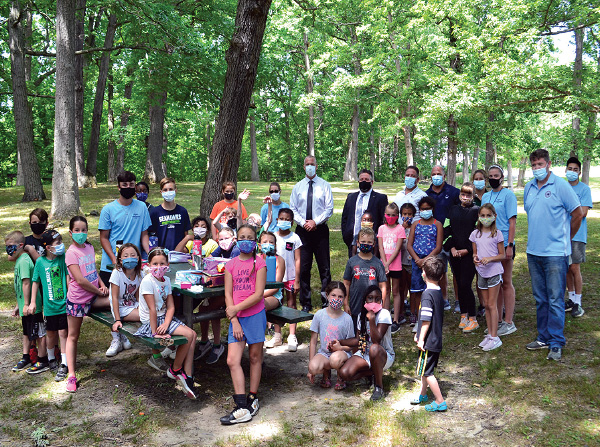
Keeping everyone safe has not been easy; following a large party to celebrate July 4, Albany County saw an uptick in the number of COVID-19 cases. This caused McCoy to use time during his daily COVID-19 briefings to encourage the public to follow safety precautions. And, during this critical time, Albany County offices, including McCoy’s, never closed. McCoy says he wants to make sure he is available to answer questions he has received from the public either on the county website or on Facebook.
For McCoy, staying in touch with county residents is the best way to keep people safe. He will continue his daily briefings and constant social media updates to keep people informed about new health and safety information and work as hard as he can to keep Albany County’s COVID-19 infection rates relatively low.

